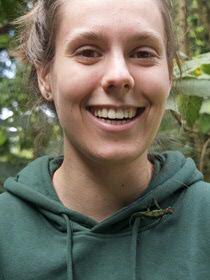Student Vera Thijssen wins Unilever Research Prize 2022
On November 24, Master student in Ecology and Evolution Vera Thijssen has been awarded a prestigious Unilever Research Prize for her (first) Master project ‘Advancing the mapping of vegetation structure in savannas using Sentinel-1 imagery’. Vera developed a new method to determine landscape-wide variation in vegetation height from radar satellite imagery.

Developing the new method required extensive ground-truthing fieldwork in Tanzania under challenging conditions combined with complex data analysis. Her project makes a key contribution to understanding how climate change will affect nature and people across Africa. Vera is now doing a second research project on tropical biodiversity in Panama.
Other activities
Parallel to her regular master research activities, Vera follows the Honours College programme ‘Leadership: making the difference’, and is student chair for the Programme Committee of the Masters programmes Biology, Ecology and Evolution, Marine Biology and Biomolecular Sciences. Next to this, she volunteers as a group leader for the foundation ‘Het vergeten kind’, organizing weekends and holidays for vulnerable children that can no longer live at home or that are in unstable home situations. She also developed a nature activities education book for this organization. Finally, Vera is a personal mentor and care provider for the personal budget (PGB) management of a person with a disability, and a tutor for high school students.
Unilever Research Prize
The Unilever Research Prize consists of EUR 2,500 and a special artwork: A laurel wreath bowl. A laurel wreath was given to victors in classical antiquity. This symbol is incorporated into a bowl that all winners receive. The Unilever Research Prize is awarded annually to young academics conducting promising research in chemistry, biotechnology, mechanical engineering, biology, agricultural science or social sciences. Important selection criterion is that their chosen masters’ thesis topic makes a positive contribution to one or more of the Sustainable Development Goals.
More news
-
29 January 2026
Microplastic research - media hype or real danger?
-
27 January 2026
ERC Proof of Concept grant for Maria Loi
